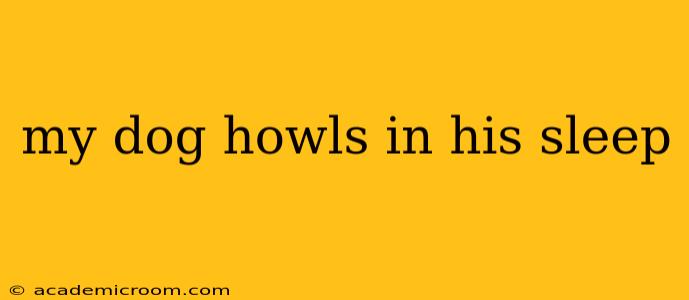It's a common scene: your furry friend, curled up in a peaceful slumber, suddenly lets out a mournful howl or a happy yap in their sleep. While it might startle you, dreaming and vocalizing during sleep is perfectly normal for dogs. But understanding why your dog howls in his sleep can offer valuable insights into his well-being and sleep patterns. Let's delve into the fascinating world of canine dreams and sleep behaviors.
What Causes Dogs to Howl in Their Sleep?
The most straightforward answer is: dreaming. Just like humans, dogs experience REM (Rapid Eye Movement) sleep, the stage associated with vivid dreams. During REM sleep, their brains are highly active, processing the day's events, emotions, and sensory experiences. These intense mental activities can manifest as physical reactions, including whimpering, barking, or howling.
What are Dogs Dreaming About?
Unfortunately, we can't tap into our dog's dreams to know for sure what's going on in their heads. However, we can infer based on their behavior during the day. If your dog spent the afternoon chasing squirrels, their dreams might involve a thrilling chase. If they experienced a stressful situation, their sleep sounds might reflect that anxiety. The howls may not represent a specific narrative but rather an emotional expression related to their dream.
Is My Dog in Pain When He Howls in His Sleep?
While dreaming is the most likely cause, it's important to rule out other potential issues. Pain or discomfort can also cause dogs to vocalize during sleep. If the howling is accompanied by other symptoms like limping, lethargy, changes in appetite, or restlessness, it's crucial to consult a veterinarian. They can determine if an underlying medical condition is causing the vocalizations.
Could Underlying Medical Conditions Cause Sleep Howling?
Yes, certain health problems can disrupt a dog's sleep and lead to howling. Conditions affecting the brain or nervous system, such as seizures or neurological disorders, can cause unusual vocalizations during sleep. Similarly, pain from arthritis, injuries, or other ailments can manifest as howling or whimpering.
People Also Ask: Is it normal for dogs to howl in their sleep?
Absolutely! It's a normal part of the canine sleep cycle, particularly during REM sleep when dreaming occurs. As long as your dog isn't exhibiting other concerning symptoms, occasional sleep howls are nothing to worry about.
People Also Ask: Should I wake my dog when he howls in his sleep?
Generally, no. Waking a dog from REM sleep can be disruptive and unsettling for them. Unless there are clear signs of distress or pain, it's best to let them sleep through it. However, if the howling is excessive, persistent, or accompanied by other symptoms, veterinary consultation is advisable.
People Also Ask: My dog is howling excessively at night, what should I do?
Excessive nighttime howling could be related to several factors – separation anxiety, underlying medical conditions, or even a disruption in their sleep-wake cycle. If it significantly impacts your sleep and well-being, seek guidance from your veterinarian or a certified dog behaviorist. They can help pinpoint the cause and recommend appropriate solutions.
Conclusion:
While the occasional sleep howl is usually harmless and related to dreaming, it's important to monitor your dog's behavior. If you notice changes in their sleep patterns, accompanying symptoms, or excessive howling, consult your veterinarian to rule out any underlying medical issues. Observing your dog's daytime activities can also offer clues about what might be stimulating their sleep sounds. Remember, a happy, healthy dog usually sleeps soundly without excessive vocalizations.
